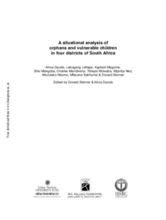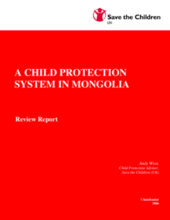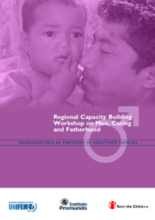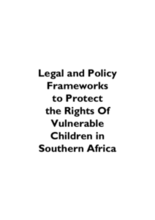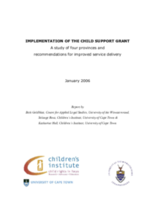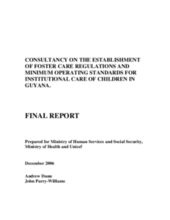Displaying 951 - 960 of 1028
Identifies strengths and weaknesses of services offered to OVC in South Africa. A detailed list of recommendations suggests improvements to services.
Examines barriers to the development of a child protection system in Mongolia. Recommendations stress the need to develop integrated child protection as an essential service comprising a dedicated national agency and appropriate legal frameworks.
This report captures the discussions and activities from a workshop held in Kathmandu, Nepal on 17-19 October 2005 on engaging men as caregivers. The report presents a background and rationale, the expectations and objectives of the workshop, and an overview of work being done to engage fathers both in the region as well as globally.
A list of bi-lateral and multilateral funding agencies for child protection. Includes names, email addresses, and particular area of focus.
Reviews legal and policy frameworks for the protection of OVC rights in 10 Southern African countries. Includes key concerns and recommendations. Appendix includes country-specific details of National Policies on Orphans and Vulnerable Children and National Plans of Action.
A situation analysis of laws, policies, and structures relevant to child protection in Sri Lanka, and a set of recommendations for improving the alternative care system.
Using fieldwork data from six sites, this report addresses the need for improved delivery of the Child Support Grant in South Africa. Includes a comprehensive review of the grant components and current system of delivery. Recommended changes to the act and regulations are highlighted.
Detailed guidelines for the establishment of the Child Protection Service (CPS), designed to address the lack of regulations concerning standards in children’s institutions and the lack of departmental policy and procedures for assessing and assisting abused and at-risk children. Includes comprehensive set of CPS forms in 14 annexes.
Examines the transition from residential care to family-based, community care models in five European / Eurasian countries.
An assessment to determine MGLSD and District Management and operational capacity needs in providing leadership, coordination, and monitoring and evaluating the national response to OVC and AB/Y in Uganda.

